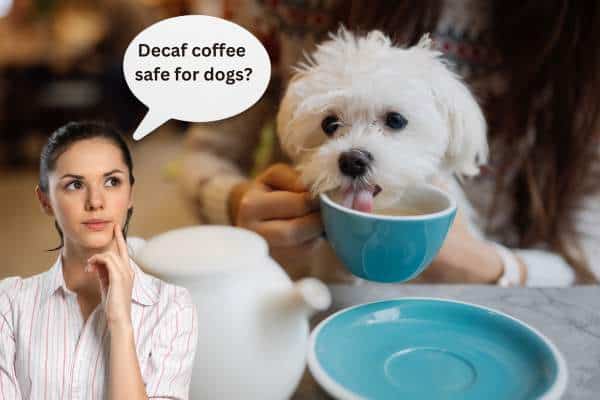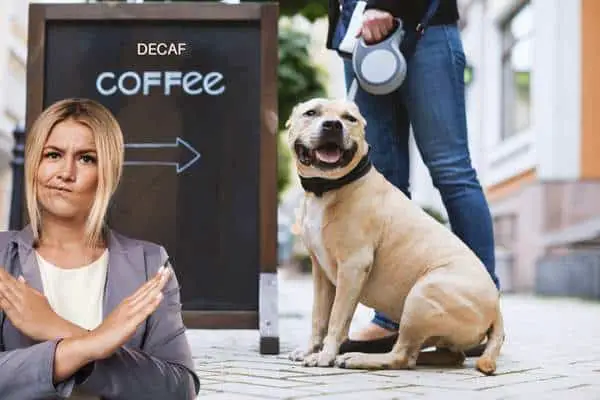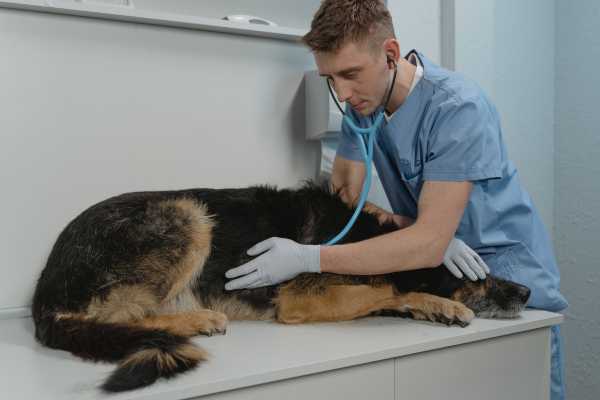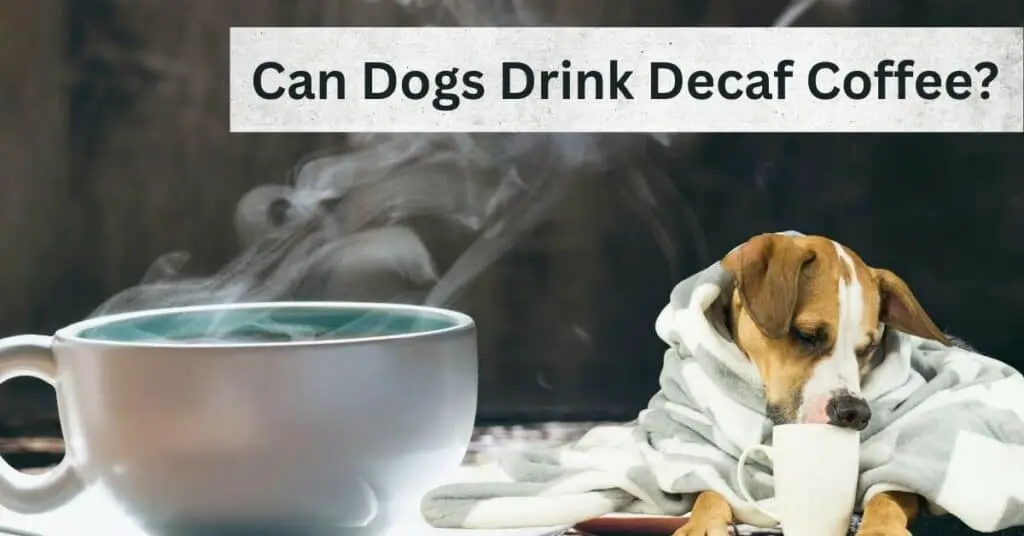Many people consider decaffeinated beverages a safe option since most caffeine is removed. However, decaf coffee is not 100% caffeine-free, so it will contain approximately 3 mg of caffeine per cup.
Although decaf coffee is an excellent choice for caffeine-intolerant people, it differs for kids and pets. Many researchers have found that caffeine is not suitable for dogs.
So pet owners think of providing decaf coffee since it has significantly less caffeine when compared to regular coffee. Before giving decaf coffee to your dog, it is essential to know whether it is safe.
Some resources mention that if you provide moderate amounts of decaf coffee, the caffeine will not significantly affect its health. In contrast, decaf coffee is not caffeine-free. Even the tiny amount of caffeine in this beverage can cause adverse effects on your pet. Hence, preventing your dogs from drinking both caffeinated and decaffeinated beverages is better.
You should know more about dogs drinking decaf coffee as a pet owner. In this blog, we have included the necessary information to help you.
Is Decaf Coffee Good for Dogs?

Imagine that after a long day at work, you return home and make a good cup of decaf coffee. This beverage will help you feel refreshed and safe since you are not consuming much caffeine.
In contrast, can you expect the same reaction by providing decaf coffee to your tired dog?
Caffeine in small doses is also unsafe for your pet, as it may cause adverse health problems. Although decaffeination removes 97% of the caffeine, that does not imply it is safe for pets.
You may witness symptoms of high blood pressure, panting, restlessness, increased heart rate, and digestive problems in dogs when they consume caffeine from food or drink.
If you are concerned about your pet’s development and healthy growth, avoiding decaf coffee or other caffeinated beverages is best.
Why You Should Not Give Decaf Coffee to Dogs

You might be curious why decaf coffee is unsafe for dogs. Following are a few reasons why you must refrain from providing decaffeinated coffee to your dog.
Caffeine
Caffeine is a stimulant in most drinks like coffee, decaf coffee, tea, hot chocolate, soft drinks, and other energy drinks.
This stimulant will help improve your central nervous system and brain activity. However, caffeine is not a good option for dogs because it can affect their health. According to your dog’s weight and health condition, the severity of the health effects will differ.
Most professionals advise against providing any caffeine to your dogs. So decaf coffee will also go off your dog’s food list, as this beverage has 3 mg of caffeine per cup.
Sweeteners
Added sugar that you may include to enhance the taste of the decaf coffee will also negatively impact your dog’s health.
Too much sugar consumption will lead to obesity. Hence, your pet’s abnormal weight gain can cause severe health issues like diabetes and heart disease. Further added sugar may also cause tooth decay.
Milk
Since dogs cannot digest lactose, milk and creamer in decaf coffee will cause stomach upsets. Especially dogs show lactose intolerance symptoms more than pups.
Chemicals
This beverage may contain other harmful chemicals if you provide decaffeinated coffee decaffeinated through methylene chloride.
These chemicals will affect the health of your dog. Further, methylene chloride decaffeination removes most of the nutrients in the coffee beans.
What Happens If Your Dog Consumes Decaffeinated Coffee?

Imagine that you left a cup of decaf coffee on a living room table. After a while, when you notice the cup is empty, and question your child whether she drank it.
She said the dog was hungry and craving coffee, so she fed him the whole cup. Alas!
In such a situation, don’t panic; instead, check on your pet. Caffeine ingestion will affect the following organs.
Central Nervous System
The small amount of caffeine in decaf coffee can stimulate the central nervous system of your dog. As a result, the dog will show signs like hyperactivity, restlessness, panting, and an increased heart rate.
Cardiovascular System
As mentioned above, caffeine intake increases the heart rate of your dogs.
The regular heart rate of your pet will be between 60 and 90 beats per minute, but if the dog ingests caffeine, the heart rate will increase to around 100 beats per minute.
Gastrointestinal Tract
If your pet drinks decaf coffee, the caffeine in this drink will stimulate the gastrointestinal tract.
As a result, the dog will experience symptoms like vomiting and diarrhea.
Urinary Tract
Although decaf coffee has no diuretic effect, the caffeine in the drink may cause this effect in your pets. So it will increase your dog’s urination.
Hence, some common symptoms of caffeine toxicity you may notice in your dog are panting, diarrhea, vomiting, increased urination, increased heart rate, restlessness, hyperactivity, and dehydration.
One or two sips of decaf coffee will only cause some mild symptoms. If the dog consumes excessive decaf coffee, immediately take it to a veterinarian.
Taking the glass or bowl from which your pet drank the beverage is best. This will help determine the amount of decaf coffee your dog consumes.
Keep Caffeinated Foods Out of Reach

You might understand that decaf coffee or any caffeinated drink is unsuitable for your dog.
The pet will be interested in trying a sip of your morning joe, but keeping the beverage out of reach is better. This will prevent your pet from experiencing the adverse effects of caffeine. Further, if you provide caffeinated drinks to your guest, ensure they don’t share them with your dog.
Around 140 mg of caffeine per kg will be fatal for dogs, so some dog owners provide small doses. The best advice is to prevent your dog from consuming any caffeine.
Top 6 Safe Beverages for Your Dog Besides Water

There are some healthy beverages that you can provide to your dog to keep it hydrated. These beverages are not water replacements; instead, they are supplements.
Occasional consumption of the following drinks in small quantities will be significant.
- Unsalted broth
- Sugar-free Fresh Fruit juices (avoid grape and citrus-based juices)
- Nut milk
- Vegetable juice
- Coconut water
- Pedialyte
If you doubt that the above drinks suit your dog’s health, ask your veterinarian about them.
Bottom Line
Professionals say avoiding decaf coffee from your dog’s food list is better. Since decaf coffee also contains caffeine, this will affect your dog’s central nervous, gastrointestinal, cardiovascular, and urinary systems.
As a result of ingesting caffeine, the dog will show specific symptoms. Moderate intake of decaf coffee will show some mild effects, whereas excessive consumption may lead to life-threatening consequences.
The best idea is to keep caffeinated beverages away from your pet. Instead, you can provide healthy drinks as supplements for your dog.
FAQs
Is Decaf Coffee Bad For Your Dog?
Yes, the caffeine in decaf coffee will cause hyperactivity, restlessness, increased urination, etc., in your dog. Hence, it is better to avoid any drinks that contain caffeine.
Is There Caffeine in Decaf Coffee?
Yes, decaf coffee has around 3mg of caffeine per eight-ounce cup. Though this will not impact caffeine-intolerant people, there are better options for pets and kids.
Can I Add Decaf Coffee Grounds To My Dog’s Food?
Since decaf coffee grounds contain caffeine, it is better to ask your veterinarian to add them to your pet’s food.





